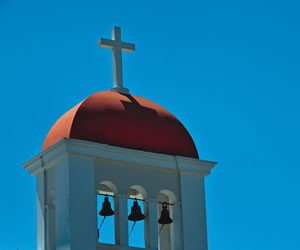Once the off-season mainstay of budget properties in secondary markets, religious meetings have a lot more options available to them these days. Increasingly, destinations and properties are eager to capture what is viewed as a stable and consistent source of business.
According to a recent poll of planner members of the Religious Conference Management Association (RCMA), religious meetings are taking advantage of their newfound clout by choosing downtown hotels, conference centers and even resorts (see sidebar).
"Religious-meeting planners are finding they are some of the most popular people around these days," says RCMA Executive Director DeWayne Woodring. "They are being deluged with sales calls, mailings and special invitations to participate in FAM trips.
"Sales professionals realize that through the years, the religious segment of the meetings industry has shown to be the one that holds steady," he continues. "When compared to the more volatile corporate meetings market, it can be counted on to deliver."
For a growing number of cities, religious meetings are big business.
"They are our bread and butter," says Jason Dunn, director of multicultural affairs and community development for the Cincinnati USA CVB. "The religious and association market makes up about 95 percent of the convention business in Cincinnati."
In Grand Rapids, Mich., the religious market is also going strong, says Bob Snyders, national sales director for Experience Grand Rapids, formerly the Grand Rapids/Kent County CVB.
"We hosted RCMA in 2009, which brought in 1,200 attendees, so religious meetings were about 8 percent of our overall business last year," he says.
Cost Conscious
While religious meeting planners may enjoy being in demand, the tough economic climate is also putting them under increased pressure to keep meetings affordable for attendees, many of whom pay their own way.
"The economy has affected the religious meetings market tremendously," says Vern Byrd, operations director for the Center for Youth Evangelism at Andrews University in Berrien Springs, Mich. "First off, planners are getting smarter. While they used to get the Cadillac version of meetings with the biggest rooms and most expensive food packages, now they are scaling back.
"They are taking rooms that might not be as nice as before and scaling down food service," he continues. "For example, if they used to spend $25 per plate, they are now spending $12 or $13 per plate. I've seen this happening for the past two or three years."
Because so many attendees of religious meetings pay their own way, planners are finding themselves challenged to keep people from booking outside the room block, according to Dunn.
"A lot of attendees are becoming savvier in finding hotels outside the room block at cheaper rates," he says, adding that he's also seen shortened event lengths.
"This year alone, we've had three or four conventions that have shortened their events to help save on costs," Dunn continues. "Some have gone from five or six days to three or four. I am also finding that planners are negotiating two- or three-year deals to get better rates."
Negotiating for rates is a skill that religious planners have honed, he says.
"A lot of planners are recognizing their power," he says. "They are leveraging incentives. They are also asking for less attrition, free convention centers and lower rates."
Location Considerations
Where are religious groups meeting these days?
It depends on whom you ask.
While meeting in first-tier cities such as Chicago or Boston may have been a pie-inthe- sky dream for religious meeting planners five years ago, times have changed, according to Byrd.
"In the last two or three years, big cities have noticed more groups leaving because of high prices, so they are now offering more deals," he says. "Now they are giving things like free parking at hotels and stuff like never before. Small meetings are going to larger cities more and more these days because they are getting better deals."
Although first-tier cities may be getting some religious meeting business, smaller cities are still getting a share of the pie, says Dawn Bernardes, sales manager for religious meetings at the Springfield [Ill.] CVB.
"We have a lot of religious meetings," she says. "Since we are an economical destination, we've had some larger organizations take a closer look at Springfield because we are so affordable. If groups, especially larger ones, used to go to higher-tier cities, they are reconsidering their options because of the economy."
Regardless of a city's size, the economic climate is forcing groups to look closer to home, according to Grant Medford, director of student and family ministry at the Illinois Baptist State Association.
"With the downturn in the economy, churches that had been going to the nationally sponsored events are now returning to more regional events, which has been good for us," he says.
Community Involvement
Another trend is for religious groups to get more closely involved with the communities in which they are meeting.
"A lot of them are really trying to get more engaged; they want to leave something to the city," says Cincinnati's Dunn. "Some churches will canvas the downtown or surrounding areas and encourage patrons to be part of Islam or Jesus Christ. The groups are also engaging the public by offering concerts and opening them up to the community that may not be part of the convention.
"Last year we matched up a group with Macy's for a gospel concert," he continues. "The entire city came out in support of the convention."
Grand Rapids' Snyders sees the same trend.
"Over the past three or four yeas, we've seen that all denominations are willing to reach out to the community," he says.
According to Andrews University's Byrd, religious groups should always offer something to the community in which they meet.
"It doesn't matter what church organization you are from, you should always give something back," he says. "It is good for the community and good for the organization. It gives a group name recognition and offers a 'wow' affect."
Future Forecast
What does the future hold for religious meetings?
"I really think the meetings are going to increase," Byrd says. "I do think groups will continue to stay closer to their base and, if there is a local convention, they will opt to go there. However, I can see expansion in the future and groups planning larger conventions."
Cincinnati's Dunn agrees.
"I see the religious market growing," he says. "We live in a world where you need hope and you need people to lean on; it is human nature. I think religious people will become closer to God and religious meetings will grow."






